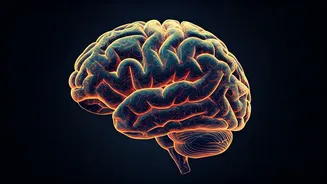Embrace Regular Exercise
Regular physical activity is vital for brain health. Exercise improves blood flow to the brain, delivering essential nutrients and oxygen. This enhances
cognitive function and helps reduce the risk of age-related cognitive decline. Activities such as brisk walking, jogging, or even dancing can stimulate the brain's neuroplasticity, fostering the growth of new brain cells and strengthening existing connections. Aim for at least 30 minutes of moderate-intensity exercise most days of the week. Consistent exercise not only benefits physical health but is also a cornerstone for maintaining a sharp and active mind, aiding in better memory, focus, and overall cognitive performance. Incorporating exercise into your routine is a proactive step toward preserving and enhancing brain health.
Prioritize Mental Stimulation
Keep your mind engaged through constant mental stimulation. Activities that challenge your brain, such as learning a new language, playing strategic games like chess or Sudoku, or engaging in hobbies that require problem-solving, can boost cognitive abilities. These activities help create and strengthen neural pathways, enhancing memory, focus, and overall cognitive function. Reading regularly, solving puzzles, and taking up new skills also keep your brain active. By continuously challenging your mind, you help protect against cognitive decline and enhance your brain's capacity to adapt and learn. Making mental stimulation a part of your daily routine is a proactive and rewarding way to ensure a sharp and engaged mind, especially as you get older.
Nourish with a Balanced Diet
What you eat directly impacts your brain function. Incorporating a balanced diet rich in brain-boosting nutrients is essential for cognitive health. Focus on foods like fruits, vegetables, and foods high in omega-3 fatty acids, such as fatty fish, which are vital for brain cell function. Limit processed foods, excessive sugar, and unhealthy fats, which can negatively affect cognitive abilities. The Mediterranean diet, known for its emphasis on whole foods and healthy fats, is often recommended for brain health. A well-nourished brain is better equipped to handle daily challenges and remain sharp. Eating a brain-healthy diet helps provide the essential nutrients needed to support optimal cognitive function and reduce the risk of cognitive decline.
Ensure Sufficient Sleep
Adequate sleep is crucial for optimal brain function. During sleep, your brain consolidates memories, clears out toxins, and repairs itself. Aim for 7-9 hours of quality sleep each night to help boost cognitive performance. Sleep deprivation can impair memory, focus, and decision-making abilities. Establishing a regular sleep schedule, creating a relaxing bedtime routine, and ensuring a comfortable sleep environment can improve sleep quality. If you have difficulty sleeping, consider implementing sleep hygiene practices such as avoiding caffeine and alcohol close to bedtime and limiting screen time before bed. Prioritizing sleep is essential for maintaining cognitive health and ensuring that your brain can function at its best, especially as you age.
Stay Socially Active
Maintaining social connections and engaging in social activities significantly benefit cognitive health. Social interaction stimulates the brain and helps to keep it active. Engaging in conversations, participating in social events, and building strong relationships can help reduce the risk of cognitive decline and improve overall mental well-being. Social interaction challenges the brain and promotes cognitive flexibility. It encourages the exchange of ideas and perspectives, which keeps the mind stimulated and sharp. Making an effort to socialize regularly, whether through group activities, community involvement, or spending time with loved ones, is a proactive way to support brain health. Staying socially connected helps maintain cognitive function and enhances your overall quality of life.













